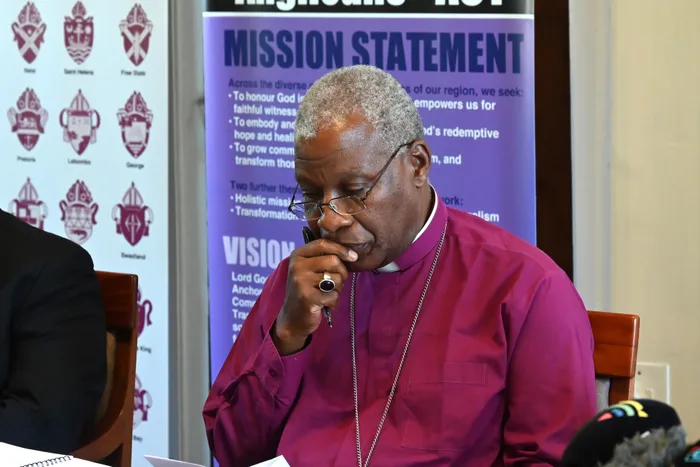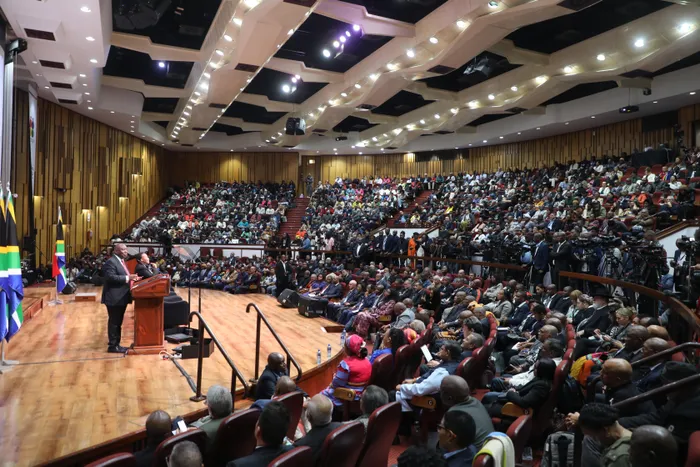
Archbishop Thabo Makgoba is a member of the Eminent Persons Group for the National Dialogue.
Image: Ayanda Ndamane/Independent Newspapers
Anglican Archbishop Thabo Makgoba has urged communities across South Africa not to allow politicians to take control of the National Dialogue.
Makgoba, who was appointed by the president to be among the Eminent Persons Group, was speaking during a church service at Taung in North West Province.
The National Dialogue is a government initiative designed to unite South Africans in addressing the country's most pressing issues.
This includes social, economic, and political challenges. Its purpose is to spark discussions at a grassroots level, identify common ground, build a collective vision for progress, and strengthen democratic processes.
It is believed to be a phased, participatory process involving local consultations, sectoral discussions, and provincial gatherings. There is expected to be a second convention in early 2026 where a national programme of action will be adopted.
The Eminent Persons Group is made up of leading figures in society with a proven commitment to advancing social cohesion and nation-building.
Pointing out that the process would include nearly 14,000 community dialogues at ward, district and sectoral levels, Makgoba said: "Given the levels of dissatisfaction at the grassroots in our society, any politician who thinks he or she can control the process is sorely mistaken. The process can generate new policies and even new political parties.
"I urge all of you at every level to make your voices heard: In Taung, in Kuruman, in Bathlaros, in Danielskuil, in Upington, in Kimberley and in every town and district in the Diocese, take possession of the process and organise around it.
"And I would urge every South African, in every community in the country, to follow your example."
The archbishop was preaching at a family day service of the Diocese of Kimberley and Kuruman. In his sermon, he highlighted that South Africa's failures "are not only of government; they are failures of the private sector also, and failures in our own communities”.
“We are squandering what God has bequeathed us through the generations which fought for our liberation, and that is why, despite the criticisms of the National Dialogue process, which was launched earlier this month, I agreed to join the group of independent figures who have been asked to be advisers to the process.
“I said long before I was asked to serve that the dialogue won't work if it is dictated to, by politicians, and our group of advisers is having discussions with the legacy foundations who have those concerns.
"My impression is that many of those who reject the dialogue either have material interests to defend or reflect a middle-class which is protected from the worst of the bad governance most of us experience, and I don't hear the critics suggest alternatives other than trotting out party manifestos.
"In the 1990s we negotiated the cornerstones of our democracy through the body known as Codesa. I have long urged that we need a Codesa 2 to negotiate a new social compact governing land and the economy. The National Dialogue gives us our best shot at doing that.
"The evidence I see, particularly from rural communities such as my own in Limpopo province, is that most ordinary South Africans agree. I am obsessed with the need for solutions beyond talk. For as the Scripture says, faith without action is dead. (James 2:17)
"A group of respected grassroots organisations, including shack-dwellers, housing activists and human rights groups, which is attending the dialogue, has acknowledged that the process is flawed and its ambitions may be unrealistic.
“'Yet,' the group says, 'It marks a radical departure from past government-led engagements. In some ways, it is a quiet admission: the fate of the nation cannot be left to a government that has poor political will and evidently no solutions. For once, the call is going to the public—overwhelmingly poor and working-class—for answers'."

Explore the challenges facing South Africa as President Ramaphosa's National Dialogue unfolds amidst rising unemployment and public discontent. Are citizens calling for action or merely more dialogue?
Image: Oupa Mokoena / Independent Media
Prior to the inaugural event, President Cyril Ramaphosa has defended the decision to proceed, stating that the National Convention is essential for South Africa's people to take ownership and control of the National Dialogue.
He also took a pointed jab at those who chose not to participate during his opening address.
“We are sons and daughters of the soil, of the ground – this is where we come from,” he said.
“We share a common past, but we also share a common destiny. We share the same inheritance of division, of inequality, of pain, and of injustice.”
“We share the same pride at ending the crime of apartheid and establishing a constitutional democracy. We also share a common future – a future that binds us together.”
theolin.tembo@inl.co.za
Related Topics: